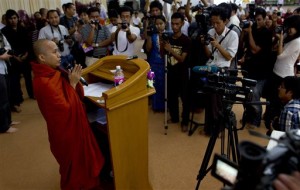
In this June 13 2013 photo, Buddhist monk Wirathu, left, who is accused of instigating sectarian violence between Buddhists and Muslims through his sermons, delivers a speech at an assembly of Myanmar’s powerful Buddhist clergy in Hmawbi, outskirts of Yangon, Myanmar. Upon seeing his photo splashed across the cover of Time magazine with the words “Face of Buddhist Terror,” Myanmar’s most-talked-about monk was unfazed, saying no amount of bad publicity could hurt him. AP Photo
YANGON — Myanmar has reacted angrily to a Time magazine cover story on a prominent radical monk accused of fuelling anti-Muslim violence, accompanied by the headline “The Face of Buddhist Terror.”
Social media users in the former junta-ruled nation also voiced dismay at the US magazine’s July front page, which shows a photograph of controversial Mandalay monk Wirathu, whose anti-Muslim remarks have come under scrutiny following a wave of deadly religious violence.
The Time report “creates a misunderstanding of Buddhism which has existed for thousands of years and is the religion of the majority of our citizens,” said a statement posted on the presidential office website late Sunday.
“The government is currently striving with religious leaders, political parties, media and the people to rid Myanmar of unwanted conflicts,” it said, adding that the issue of religion should be handled respectfully by the media.
In a sign of the strength of feeling, one online petition started over the weekend to condemn the magazine had collected almost 40,000 names by Monday.
The use of the words “Buddhist” and “Terror” upset all followers of the faith, which is peaceful “and not for terrorists,” a message accompanying the petition said.
Eye-witnesses to violence which flared in March in central Myanmar said people dressed in monks’ robes were involved in the unrest, which left scores dead, mainly Muslims.
Radical monks have led a campaign to shun shops owned by Muslims. Wirathu has also called for a law to restrict marriages between Buddhist women and men of other faiths.
Senior monks, however, have accused foreign media of one-sided reporting of the Buddhist-Muslim conflict.
Facebook users accused Time of deepening divisions and defaming Myanmar’s main religion.
“Insulting the monk Wirathu, a son of Buddha, is the same as insulting Buddhism,” said one post by Wai Phyo.
“What Wirathu is doing now is to protect our own nationality and religion,” the Facebook user wrote, urging the magazine to apologize.
“Obviously this writer doesn’t understand Myanmar and Buddhism well,” another post said.
Several episodes of religious fighting have exposed deep rifts in the Buddhist-majority country and cast a shadow over widely praised political reforms since military rule ended two years ago.
In March at least 44 people were killed in sectarian strife in central Myanmar with thousands of homes set ablaze.
Communal unrest last year in the western state of Rakhine left about 200 people dead and up to 140,000 displaced, mainly Rohingya Muslims.